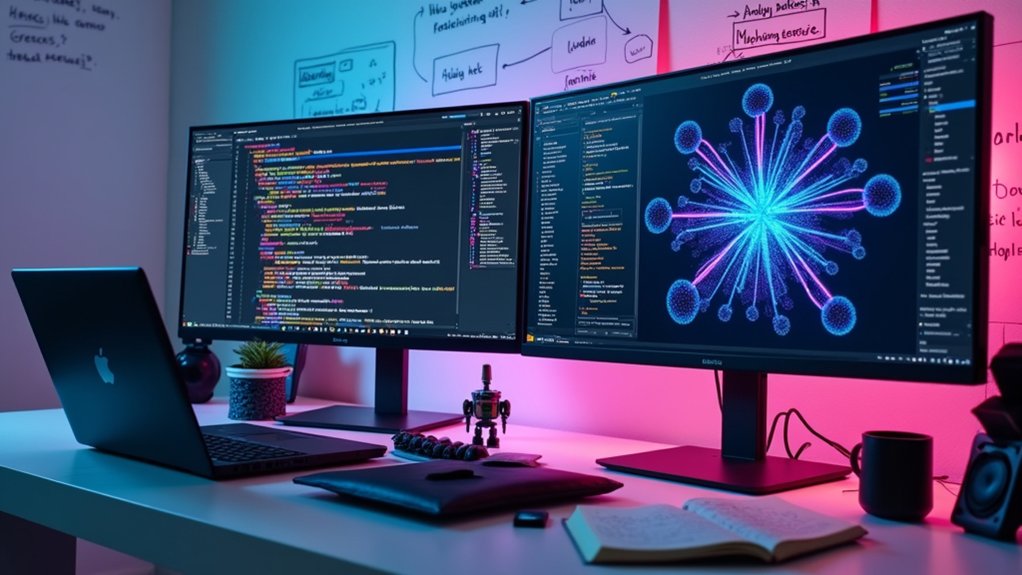AI trainers bridge tech and practical applications by enhancing AI response quality. They clean data, identify patterns, and prevent biases—no small feat. These pros need programming chops in Python or R, plus machine learning framework expertise. They're constantly collaborating with data scientists and engineers while making ethical calls about AI behavior. A computer science degree helps, but staying current on evolving tech is non-negotiable. The rabbit hole goes much deeper.

Diving into the world of AI trainers reveals a position that's far more complex than most realize. These professionals aren't just tech geeks with fancy degrees. They're the unsung heroes behind every "intelligent" response your digital assistant gives you. Not impressed? You should be.
AI trainers need serious technical chops. They're data analysis wizards, constantly sifting through mountains of information to spot patterns the rest of us would miss. Natural language processing? They live and breathe it. Without their expertise, your AI would sound like a drunk robot trying to recite Shakespeare.
They're also deep into machine learning and have to master programming languages like Python or R. And yes, they need to understand frameworks like TensorFlow and PyTorch. Before building any AI model, they must focus on problem definition to determine the most effective approach. After selecting appropriate machine learning algorithms, they guide the development process from start to finish. No big deal, right?
The data management side is where things get really dirty. AI trainers clean and organize datasets that would make most people's brains explode. They annotate endless streams of data so AI can recognize what's what. Quality control is essential – one biased dataset and suddenly your AI thinks all doctors are men or some equally ridiculous notion.
They're constantly updating information too. AI doesn't learn just once, folks.
Don't think for a second these trainers work in isolation. They're constantly collaborating with data scientists to fine-tune models. Software engineers? They're practically attached at the hip.
Perhaps their most underappreciated skill is translating complex AI concepts for regular humans who wouldn't know an algorithm from their elbow.
Team meetings are a staple in their diet. AI systems don't build themselves, contrary to what sci-fi movies suggest. The communication never stops.
In essence, AI trainers are the bridge between raw technology and useful artificial intelligence. They combine technical expertise with data management skills and throw in a healthy dose of human communication. AI trainers must also exercise strong ethical judgment when training systems to ensure fair and unbiased AI behavior. These professionals typically need a bachelor's or master's degree in computer science, data science, or related fields to break into this demanding role. Without them, AI would be, well, pretty dumb.
And in today's tech-obsessed world, that's the one thing we can't afford.
Frequently Asked Questions
What Is the Salary Range for AI Trainers?
AI Trainers earn between $40,000 and $90,000 annually. Not too shabby.
Mid-level pros with 3-5 years under their belt can rake in $90,000 to $130,000, while top-tier trainers might hit $150,000.
Location matters—urban areas pay more. Technical chops in TensorFlow and PyTorch boost earning potential.
Project complexity counts too. Geography is huge. Some places pay peanuts, others shower you with cash.
Do AI Trainers Need Programming Experience?
Yes, programming experience is non-negotiable for AI trainers.
They absolutely need skills in languages like Python, Java, and C++. It's literally part of the job description.
These techies work with complex AI frameworks—TensorFlow, PyT—daily. Without coding chops, they'd be useless.
Programming isn't just helpful; it's essential for data preparation, model training, and performance evaluation.
No code knowledge, no job. Simple as that.
Can AI Training Be Done Remotely?
Yes, AI training can absolutely be done remotely.
The work primarily involves digital tools and datasets that are accessible from anywhere with a good internet connection. Many companies now employ remote AI trainers.
It's practical. No need to commute to an office when you're mainly working with virtual systems.
Remote AI trainers can collaborate with global teams through video calls and shared platforms.
Location doesn't matter much in this field.
How Long Does It Take to Become an AI Trainer?
Becoming an AI trainer isn't an overnight gig. Most need at least a bachelor's degree in computer science or data science.
Master's programs take about 20 months to complete. Then there's the skill-building phase—programming languages, machine learning algorithms, data analysis.
The whole journey? Several years, typically. Employment in this field is growing fast though—projected to rise 23% by 2032.
Worth the wait? Probably.
What Career Advancement Opportunities Exist for AI Trainers?
AI trainers have solid growth potential. They can climb into leadership roles like AI Director, or specialize in areas like NLP.
Some branch into consultancy, teaching, or research. The industry options? Diverse. Healthcare, finance, education—they're all hungry for AI talent.
Job growth looks impressive at 23% through 2032, with salaries hitting $131,490 median. Not too shabby for teaching machines to think.




